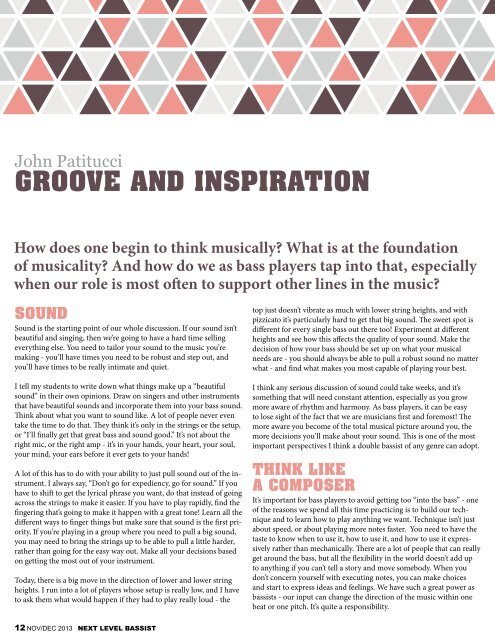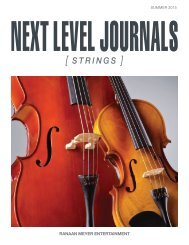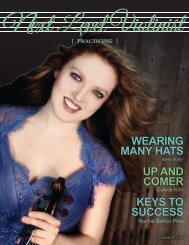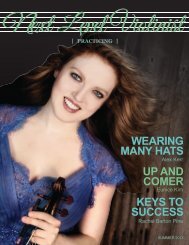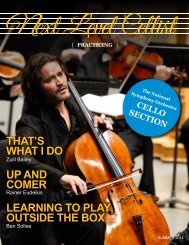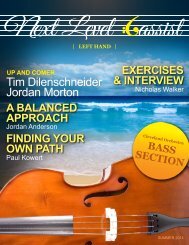Next Level Bassist Musicality Issue
Articles by Sarah Hogan and John Patitucci, Spotlight on the Pittsburgh Symphony, Double Stop Strum by Ranaan Meyer
Articles by Sarah Hogan and John Patitucci, Spotlight on the Pittsburgh Symphony, Double Stop Strum by Ranaan Meyer
You also want an ePaper? Increase the reach of your titles
YUMPU automatically turns print PDFs into web optimized ePapers that Google loves.
John Patitucci<br />
Groove and Inspiration<br />
How does one begin to think musically? What is at the foundation<br />
of musicality? And how do we as bass players tap into that, especially<br />
when our role is most often to support other lines in the music?<br />
Sound<br />
Sound is the starting point of our whole discussion. If our sound isn’t<br />
beautiful and singing, then we’re going to have a hard time selling<br />
everything else. You need to tailor your sound to the music you’re<br />
making - you’ll have times you need to be robust and step out, and<br />
you’ll have times to be really intimate and quiet.<br />
I tell my students to write down what things make up a “beautiful<br />
sound” in their own opinions. Draw on singers and other instruments<br />
that have beautiful sounds and incorporate them into your bass sound.<br />
Think about what you want to sound like. A lot of people never even<br />
take the time to do that. They think it’s only in the strings or the setup,<br />
or “I’ll finally get that great bass and sound good.” It’s not about the<br />
right mic, or the right amp - it’s in your hands, your heart, your soul,<br />
your mind, your ears before it ever gets to your hands!<br />
A lot of this has to do with your ability to just pull sound out of the instrument.<br />
I always say, “Don’t go for expediency, go for sound.” If you<br />
have to shift to get the lyrical phrase you want, do that instead of going<br />
across the strings to make it easier. If you have to play rapidly, find the<br />
fingering that’s going to make it happen with a great tone! Learn all the<br />
different ways to finger things but make sure that sound is the first priority.<br />
If you’re playing in a group where you need to pull a big sound,<br />
you may need to bring the strings up to be able to pull a little harder,<br />
rather than going for the easy way out. Make all your decisions based<br />
on getting the most out of your instrument.<br />
Today, there is a big move in the direction of lower and lower string<br />
heights. I run into a lot of players whose setup is really low, and I have<br />
to ask them what would happen if they had to play really loud - the<br />
top just doesn’t vibrate as much with lower string heights, and with<br />
pizzicato it’s particularly hard to get that big sound. The sweet spot is<br />
different for every single bass out there too! Experiment at different<br />
heights and see how this affects the quality of your sound. Make the<br />
decision of how your bass should be set up on what your musical<br />
needs are - you should always be able to pull a robust sound no matter<br />
what - and find what makes you most capable of playing your best.<br />
I think any serious discussion of sound could take weeks, and it’s<br />
something that will need constant attention, especially as you grow<br />
more aware of rhythm and harmony. As bass players, it can be easy<br />
to lose sight of the fact that we are musicians first and foremost! The<br />
more aware you become of the total musical picture around you, the<br />
more decisions you’ll make about your sound. This is one of the most<br />
important perspectives I think a double bassist of any genre can adopt.<br />
Think like<br />
a composer<br />
It’s important for bass players to avoid getting too “into the bass” - one<br />
of the reasons we spend all this time practicing is to build our technique<br />
and to learn how to play anything we want. Technique isn’t just<br />
about speed, or about playing more notes faster. You need to have the<br />
taste to know when to use it, how to use it, and how to use it expressively<br />
rather than mechanically. There are a lot of people that can really<br />
get around the bass, but all the flexibility in the world doesn’t add up<br />
to anything if you can’t tell a story and move somebody. When you<br />
don’t concern yourself with executing notes, you can make choices<br />
and start to express ideas and feelings. We have such a great power as<br />
bassists - our input can change the direction of the music within one<br />
beat or one pitch. It’s quite a responsibility.<br />
12 NOV/DEC 2013 NEXT LEVEL BASSIST


